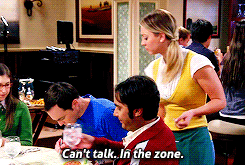In many ways, fiction writing is a profession without routine. One day you’re outlining your plot and character descriptions, another you’re writing or editing scenes, still another you’re preparing your novel for publication and marketing. It’s a great career path for artists who like to be surprised by their work every day! But there is one thing that separates the truly productive writers from the dreamers and wannabes, and that’s developing good writing habits. If you really want to be a professional writer, you must build these habits; they’re the best way to keep you writing your whole life!
So for those of you who are serious about being productive writers, here are five good writing habits you should start developing today. Enjoy, and best of luck in your writing career!

Good Writing Habit #1: Write every single day.
 If you truly want to be a writer, you must write; otherwise you’re just a dreamer with an idea. But it’s not enough to write every once in a while; then you’re just a dreamer who sometimes writes their ideas down. If you’re serious about dedicating your life to writing, you must make writing your life. Not tomorrow, not in a week or a month or a year, today. Make every today a writing day. If that sounds harsh and repetitive, get ready because you’ll hear this advice everywhere until it sinks in: if you want to be a writer, you must write every single day.
If you truly want to be a writer, you must write; otherwise you’re just a dreamer with an idea. But it’s not enough to write every once in a while; then you’re just a dreamer who sometimes writes their ideas down. If you’re serious about dedicating your life to writing, you must make writing your life. Not tomorrow, not in a week or a month or a year, today. Make every today a writing day. If that sounds harsh and repetitive, get ready because you’ll hear this advice everywhere until it sinks in: if you want to be a writer, you must write every single day.
Of course, writing every day won’t always be easy (that’s what Habits 4 and 5 are for), but even the smallest steps of progress are better than not getting anything done at all. If you really have trouble writing when you should, try setting a writing schedule or some simple tasks to ensure you stay productive. Write down new ideas, outline your novel, work on a short story or a new scene of your book. Whatever you do, make sure you log some writing time every day until it becomes a habit. Hard as it may seem at first, you’ll soon find that it feels wrong not to write every day. Your future novelist self will thank you!
Good Writing Habit #2: Read as often as possible.
If you don’t have time to read, you don’t have the time (or the tools) to write. Simple as that. – Stephen King, On Writing
 This may sound like a given, but you’d be amazed how many aspiring writers “don’t have time to read.” A thorough search through guest posts on writing blogs will reveal that virtually every editor, at one time or another, has rolled their eyes at a wannabe novelist who didn’t have a good answer to the question, “So what are you reading?” If you never want to be caught off guard by this question, always make time to read!
This may sound like a given, but you’d be amazed how many aspiring writers “don’t have time to read.” A thorough search through guest posts on writing blogs will reveal that virtually every editor, at one time or another, has rolled their eyes at a wannabe novelist who didn’t have a good answer to the question, “So what are you reading?” If you never want to be caught off guard by this question, always make time to read!
The point of reading often is to get a better feel for the craft of writing. The more books you read, the more you’ll understand what makes a good story (or a bad one). Not sure where to start? Try picking up a few popular novels in your favorite genre; these will teach you what goes into writing that type of story, or at least give you an idea if it’s the right genre for you. Don’t have a favorite? Try some popular books in a variety of genres until you find one you love! As long as you keep reading, you’ll have the tools and inspiration you need to write!
Good Writing Habit #3: Write now, edit later.
 One of the most common mistakes that beginning writers make is to edit while writing. It’s a tough habit to break! I know this because I still do it myself, despite knowing better. Sometimes I’ll even go as far as to not continue a sentence until I’m sure I can get exactly the right wording onto the page the first time. But as I’ve found time and again, that’s not how writing works.
One of the most common mistakes that beginning writers make is to edit while writing. It’s a tough habit to break! I know this because I still do it myself, despite knowing better. Sometimes I’ll even go as far as to not continue a sentence until I’m sure I can get exactly the right wording onto the page the first time. But as I’ve found time and again, that’s not how writing works.
First drafts will always be messy. There’s no way around that. A story is never going to be perfect right out of the gate, and that’s okay. The point of a first draft is just to get the idea out of your head; perfecting it comes later, during the editing phase. The sooner you accept this, the more productive you’ll become in your writing. So don’t worry about getting it right the first time; just keep writing and don’t look back until your first draft is done. Always remember: Done is better than perfect!
Good Writing Habit #4: Set a daily writing goal (and stick to it).
 As a writer, there will be days when you simply can’t muster up the energy or motivation to write. That’s where daily writing goals come in. When you know you should write but can’t be sure how much will count as “productive”, it helps to set a daily word count goal. That way, you can write a “bare minimum” on those low-energy days and still feel like you made progress!
As a writer, there will be days when you simply can’t muster up the energy or motivation to write. That’s where daily writing goals come in. When you know you should write but can’t be sure how much will count as “productive”, it helps to set a daily word count goal. That way, you can write a “bare minimum” on those low-energy days and still feel like you made progress!
Stephen King recommends starting at 1000 words a day, but it’s up to you to figure out what goal works best for you. If you’re way too busy to hit 1000 every day, feel free to lower the bar to a more achievable goal. Got plenty of free time on your hands? Push yourself to write 1500 or 2000 words a day! Not one for word counts? Set a daily goal instead to finish a chapter or edit one more scene. The key is to find the sweet spot of a goal low enough for you to reach every day but still high enough to bring you substantially closer to a finished work of art. Whatever goal you choose, always stay productive!
Good Writing Habit #5: Protect your writing time and space.
Be ruthless about protecting writing days, i.e., do not cave in to endless requests to have “essential” and “long overdue” meetings on those days. – J.K. Rowling
 Writing is one of the loneliest professions in the world, but most writers like it that way. The problem is when we don’t have enough time or space to dedicate to our work. That’s why I can’t stress enough the importance of having a designated writing area and schedule. It’s just as important as setting a daily goal; you can’t hope to consistently meet your quota unless you can always get into the right mindset, and one of the best ways to do this is by retreating into a corner where your imagination can flow freely without distractions. If you build the habit of visiting this space at the same time every day, writing will become a lot easier in the long run!
Writing is one of the loneliest professions in the world, but most writers like it that way. The problem is when we don’t have enough time or space to dedicate to our work. That’s why I can’t stress enough the importance of having a designated writing area and schedule. It’s just as important as setting a daily goal; you can’t hope to consistently meet your quota unless you can always get into the right mindset, and one of the best ways to do this is by retreating into a corner where your imagination can flow freely without distractions. If you build the habit of visiting this space at the same time every day, writing will become a lot easier in the long run!
 After setting your writing time and space, the next step is to guard them from the rest of your world. Writing time is sacred, and therefore should be treated as such. Close the door and work for at least an hour on a computer with no Internet connection, or for real distraction-free writing, try writing longhand on paper first and editing later as you transcribe your work to a computer. Also make sure to tell your loved ones not to disturb you during your writing time. My boyfriend understands this better than anyone I know: I love him to pieces, but he knows I’ll get crabby if he so much as tries to hug me while I’m “in the zone.” Such is the reality of a writer! Protect your writing time and space and the rest of your world will be better for it!
After setting your writing time and space, the next step is to guard them from the rest of your world. Writing time is sacred, and therefore should be treated as such. Close the door and work for at least an hour on a computer with no Internet connection, or for real distraction-free writing, try writing longhand on paper first and editing later as you transcribe your work to a computer. Also make sure to tell your loved ones not to disturb you during your writing time. My boyfriend understands this better than anyone I know: I love him to pieces, but he knows I’ll get crabby if he so much as tries to hug me while I’m “in the zone.” Such is the reality of a writer! Protect your writing time and space and the rest of your world will be better for it!
Do you practice these good writing habits? What other habits would you add to this list?


Despite my blog post this week advising to break from writing every day to avoid burn out, I do agree with your 5 good writing habits . Making the effort to write daily is how I ended up writing four books in four years, and now that I have writing as a habit, I do think it’s fine to take a day off now and then because I know I’ll just stop for that one day and then come back to it. Your advice of reading and editing later are also awesome habits to get into. Thanks for the reminder, and the great post!
Thanks! I did like your post about the caveat of writing every day, though. Avoiding burnout is definitely a legit reason to break the writing habit now and then (as long as you make sure to go back to it, of course)! Glad you liked my post! Thanks for reading! 🙂
It’s incredibly difficult to get others to respect your writing time and space but you’re definitely right, it’s important to do so if you ever plan on making writing more than a hobby!
So true! It’s definitely been a challenge for me, but when I can get into my writing space, I’m much more productive! Thanks for reading! 🙂